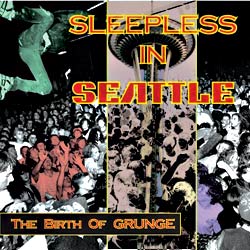VARIOUS ARTISTS
Sleepless in Seattle: The Birth of Grunge
(Livewire)
Postmortem grunge compilations are judged on two criteria: packaging (flannel? coffee beans?) and Kurdt (yes or no?). Sleepless in Seattle, Livewire’s 20-track ode to bygone lamestain days, flunks the first and slays the second. Despite still-sweating graphics from Charles Peterson and a typically informative-yet-clichéd essay from Loser author Clark Humphrey, the liner notes are a mess of superlatives, awfully yellow and faux D.I.Y, 10-point Courier-stylee. But nevermind, cob nobblers, because this is one of the comps that gets that grunge really began when Kurdt was but a babe in an Aberdeen manger. Producer Colin Cobb has sent a still-smoking valentine from the days when Jack Endino was just a guitarist, Green River meant soda instead of serial killer, and Pearl Jam was but a glimmer in Malfunkshun’s eye. We begin with the Blackouts’ no-wave-y “Happy Hunting Ground,” then clang into “Mohawk Man,” as jammed by a barely legal Mark Arm, tongue set firmly in cheek. There is a poignancy mixed with the bass wank. Some artists (Tad, Love Battery) fizzled on major labels, and others (Andrew Wood, Stefanie Sargent) overdosed before they had the chance. The whole thing flows like a prized mixtape, with a penultimate finale bang by 7 Year Bitch’s Selene Vigil. All tracks, down to Gruntruck’s freak-flag anthem “Tribe,” are crisper than a Bumbershoot elephant ear. MAIREAD CASE
VARIOUS ARTISTS
Sweeney Todd
(Nonesuch)
My sympathies to all artists competing for grant crumbs, but sometimes (if you’re clever) you can make financial constraints work for you. Stravinsky knew this when World War I forced him to stop writing for 100-piece orchestras and led him to create the no-less-evocative The Soldier’s Tale for one speaker and seven instruments, and U.K. theatrical producer John Doyle found this out when he hit upon the idea of condensing musicals simply by asking the cast to play instruments rather than hiring a separate pit band. When you’re not singing, you’re the orchestra. Stephen Sondheim’s Sweeney Todd is his latest deconstruction, acclaimed in the West End and (currently) on Broadway. Sarah Travis has been Doyle’s musical accomplice for each staging reorchestrating the show anew—which can only be done after the show’s been cast. Patti LuPone (Mrs. Lovett/tuba) and Michael Cerveris (Todd/guitar) lead the 10-person Broadway contingent on this album—a production as dark and edgy as any fan of Sondheim’s ironic, unsentimental take on human nature could wish. With just a few instruments at most in the background, the ominous creepiness in every vocal number is upped a notch; the intimacy pulls you a little nearer the characters of this penny-dreadful tale than you may care to be. In the theater, I’ve heard the effect is electrifying; on disc, it’s engineered to sound like classic radio drama (everyone’s very forward in your speakers), burrowing into your head and seducing your twisted little imagination for an experience that might be even more unsettling than it is onstage. GAVIN BORCHERT
BETH ORTON
Comfort of Strangers
(Astralwerks)
“Have you ever wanted Beth Orton’s advice on a relationship question you have long wanted answered?” So says a new section of Orton’s Astralwerks Web site called “Ask Beth,” though more than a few revelations are already found in the lyrics of her fourth album of slightly electrified folk. Produced by compositional wizard/Sonic Youth member Jim O’Rourke in two weeks, Comfort of Strangers quickly settles into a lyrical pattern of pining and purging, as Orton admits on “Shadow of a Doubt,” “It’s the year love has been a lesson/And it’s brought me more than any other blessing.” She seems to have applied a philosophical perspective—”There will always be a place aside for you”—to a year of wild love, of being recklessly open to experience, with each song addressed to different players (including herself) in the aftermath. So, what’s your burning question: Why does it hurt so bad? “Love, love, love is a one-way train/Comes on gentle as a hurricane/It’s got P.A.I.N. written all the way through” (“Rectify”). Should I take a casual partner? “One love is better than not enough/I’d rather have no love/Than messing with the wrong stuff” (the M. Ward–co-written “Comfort of Strangers”). As all her work is, Comfort is carried by Orton’s unique voice, though the electronic atmospheres of previous albums are gone. The relatively mournful silences in their place give way to resiliency—”My love’s a star you only saw the traces of”—as Orton convinces herself, and maybe you, there are more adventures to be had. RACHEL SHIMP




